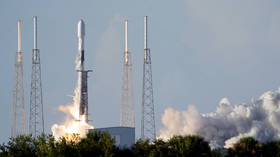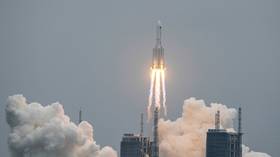Another country joins Moon race

South Korea has embarked on its first mission to the Moon, launching a craft intended to scout out future landing sites on the lunar surface and collect valuable scientific data from low orbit for at least a year.
The Danuri orbiter successfully launched from Cape Canaveral Space Force Station in Florida on Thursday night, traveling atop a Falcon 9 rocket produced by American firm SpaceX. After around 40 minutes, the craft separated from the rocket’s second stage and began its trip to the Moon in earnest, a journey expected to take several months.
Using a roundabout course designed to conserve fuel, the Danuri will reach the Moon’s orbit in December, where it will join other spacecraft operated by the US and India, as well as a Chinese lunar rover charting the Moon’s far side.
The South Korean craft will gather information about the Moon’s surface and magnetic field, aiming to maintain a low polar orbit of just 62 miles (100 kilometers). It is hoped the data-collection will continue for at least a year.
Seoul has pressed ahead on multiple space missions in recent months, successfully launching satellites into orbit using its own rocket for the first time in June, following a failed attempt last year. In May, it joined a collective of agencies led by NASA aiming to send astronauts to the Moon’s surface, and is already discussing plans for a robotic probe mission by 2030.
Other nations are also seeking to get in on the race to Earth’s only natural satellite, with Russia hoping to send off its Luna-25 lander by September after a series of delays, while Israel will take a crack at a landing in 2024 with its Beresheet 2 mission.
Danuri – which means ‘enjoy the moon’ in Korean – brought six major scientific instruments into space, including sensors and a camera designed to see perpetually darkened craters at the Moon’s poles, believed to be filled with water ice.













